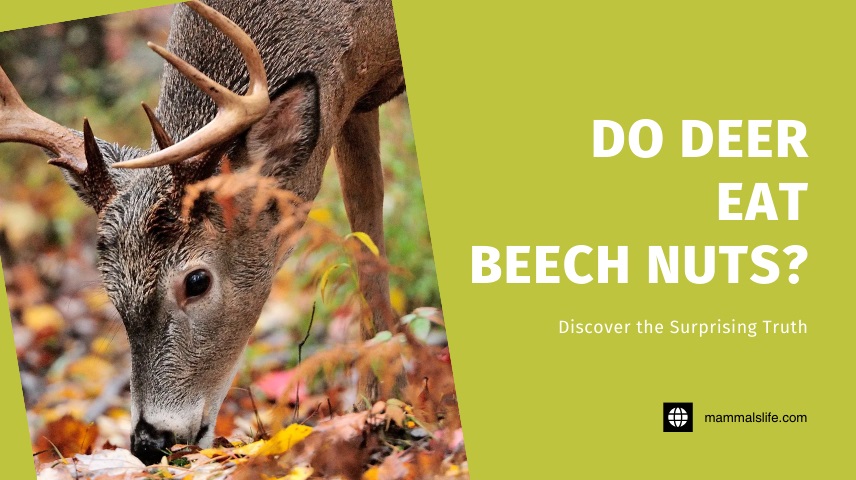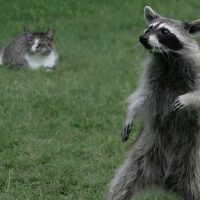Last Updated on February 22, 2025 by Mammals Life
Yes, deer eat beech nuts. These nuts provide essential nutrients for deer, especially in the fall.
Beech nuts, also known as beechnuts, are a valuable food source for deer. These small, triangular nuts fall from beech trees in autumn. Deer actively seek them out during this season. Beech nuts are rich in fats, proteins, and carbohydrates, making them an excellent energy source.
They help deer build up fat reserves for the winter months. Besides deer, other wildlife like squirrels and birds also consume beech nuts. Their availability significantly impacts local wildlife populations. Understanding this dietary habit of deer is crucial for wildlife management and conservation efforts. It also highlights the importance of preserving beech tree habitats.
Deer Diet Basics
Understanding what deer eat is crucial for wildlife enthusiasts. Deer have a varied diet that changes with the seasons.
Common Food Sources
Deer eat many types of food. Their diet includes:
- Grasses
- Leaves
- Fruits
- Nuts
Beech nuts are one of the nuts deer like. These nuts provide essential nutrients for deer.
Seasonal Variations
Deer change their diet based on the seasons. In spring and summer, they eat more green plants.
In fall, nuts and fruits become a bigger part of their diet. Beech nuts are plentiful in fall, making them a favorite.
During winter, food is scarce. Deer eat twigs and bark.
Beech Trees And Nuts
Beech trees are common in forests. They produce small nuts called beechnuts. These nuts are a food source for wildlife, including deer. Let’s explore beech trees and their nuts in more detail.
Characteristics Of Beech Trees
Beech trees are large and sturdy. They can live for many years. Their leaves are shiny and have a serrated edge. The bark is smooth and gray. Beech trees grow in many parts of the world.
Here are some key characteristics:
- Height: Up to 100 feet
- Leaves: Shiny, serrated edges
- Bark: Smooth and gray
- Lifespan: Can live over 200 years
Nutritional Value Of Beech Nuts
Beech nuts are small but nutritious. They contain fats, proteins, and vitamins. Deer and other animals eat them for energy. Here is a simple table of their nutritional values:
| Nutrient | Value per 100g |
|---|---|
| Fat | 50g |
| Protein | 20g |
| Vitamins | Various B vitamins |
Beech nuts provide essential nutrients. They are especially important for wildlife during winter. Deer rely on these nuts for survival.
Do Deer Consume Beech Nuts?
Deer are known for their diverse diet, which includes a variety of nuts. One question that often arises is whether deer consume beech nuts. This section explores field observations and expert opinions on this topic.
Field Observations
Field observations suggest that deer do eat beech nuts. During autumn, beech trees drop these nuts, which become accessible to wildlife. Hunters and nature enthusiasts have reported seeing deer near beech trees, especially during the nut-dropping season.
In forested areas with abundant beech trees, deer can often be spotted foraging on the ground. They seem to enjoy the nuts as part of their fall diet. Observers note that deer may prefer beech nuts when other food sources are scarce.
Expert Opinions
Experts in wildlife biology and ecology confirm that deer consume beech nuts. According to studies, beech nuts provide essential nutrients for deer, especially during the fall. These nuts are rich in fats and proteins, which help deer prepare for winter.
Some experts highlight that beech nuts are not a primary food source for deer. Instead, they are a seasonal supplement. Deer diets vary based on availability and environmental conditions. Thus, the consumption of beech nuts can fluctuate yearly.
Wildlife biologists also point out that deer are opportunistic feeders. They adapt their diet based on what is available in their habitat. Therefore, beech nuts become a valuable food source when they are in season.
Nutritional Benefits For Deer
Beech nuts provide deer with essential nutrients. These nuts are a significant part of their diet, especially in the fall. Understanding the nutritional benefits can help in wildlife management and habitat conservation.
Protein And Fat Content
Beech nuts are rich in protein and fat. These nutrients are vital for deer, especially before winter. A typical beech nut contains:
| Nutrient | Content per 100g |
|---|---|
| Protein | 20g |
| Fat | 50g |
The high protein content helps in muscle development. The fat content provides energy reserves.
Impact On Deer Health
Eating beech nuts has a positive impact on deer health. The nutrients support their overall well-being. Here are some key benefits:
- Enhanced Energy Levels: The fats provide quick energy.
- Improved Muscle Growth: Proteins aid in muscle repair and growth.
- Better Winter Survival: Extra fat helps them survive cold winters.
Deer that consume beech nuts are often healthier. They have better chances of thriving in their habitat.
Comparing Beech Nuts To Other Foods
Deer have a varied diet that includes many different types of food. Understanding their preferences can help in wildlife management and conservation. Let’s compare beech nuts to other foods that deer eat.
Beech Nuts Vs. Acorns
Both beech nuts and acorns are important food sources for deer. They provide essential nutrients and energy.
| Food | Nutritional Value | Availability |
|---|---|---|
| Beech Nuts | Rich in fats and proteins | Available in fall |
| Acorns | High in carbohydrates | Plentiful in autumn |
Beech nuts are rich in fats and proteins, making them very nutritious. Deer often prefer these nuts in the fall. Acorns, on the other hand, are high in carbohydrates. They are also plentiful in autumn, making them a reliable food source.
Beech Nuts Vs. Grasses
Grasses and beech nuts offer different benefits and nutrients.
- Grasses: Provide fiber and are available year-round.
- Beech Nuts: Offer high energy and nutrients, but are seasonal.
Grasses are a staple in a deer’s diet due to their availability. Deer can find them almost all year. They provide fiber and are easy to digest.
Beech nuts, though seasonal, offer high energy and nutrients. Deer seek them out in the fall for their rich content.
Implications For Deer Management
Understanding the diet of deer, including their consumption of beech nuts, is crucial for effective deer management. This knowledge helps shape strategies for habitat conservation, feeding programs, and overall population control.
Habitat Considerations
Beech trees thrive in deciduous forests. Deer often inhabit these areas, benefiting from the natural food sources available.
Maintaining a healthy population of beech trees can support deer nutrition. This helps sustain their population naturally.
Forestry practices should aim to preserve beech tree habitats. This ensures a steady supply of beech nuts for deer and other wildlife.
Feeding Strategies
During fall, beech nuts become a significant part of a deer’s diet. They provide essential nutrients that help deer prepare for winter.
Supplemental feeding programs can include beech nuts. This supports deer health, especially in areas with scarce natural food sources.
Table of Nutritional Content of Beech Nuts:
| Nutrient | Amount per 100g |
|---|---|
| Protein | 6g |
| Fat | 50g |
| Carbohydrates | 30g |
Providing a variety of food sources is key. This includes acorns, beech nuts, and other native nuts.
Feeding strategies should consider the seasonal availability of these foods. This helps ensure deer receive balanced nutrition year-round.
Frequently Asked Questions
Do Deer Eat Beech Nuts?
Yes, deer eat beech nuts, especially in the fall.
Are Beech Nuts Nutritious For Deer?
Beech nuts are highly nutritious and provide essential fats and proteins for deer.
When Do Deer Eat Beech Nuts?
Deer typically eat beech nuts during fall when they are most abundant.
Do Beech Nuts Attract Deer?
Beech nuts attract deer due to their high nutritional value and availability.
Conclusion
Deer do eat beech nuts, especially in the fall. These nuts provide essential nutrients for their diet. Observing deer behavior can offer insights into their eating habits. Understanding what deer eat helps in wildlife management and conservation efforts. Keep an eye out for more fascinating facts about deer and their dietary preferences.








